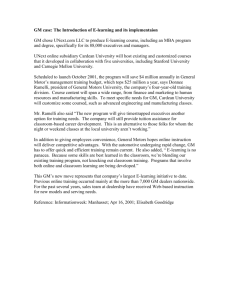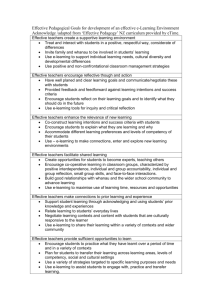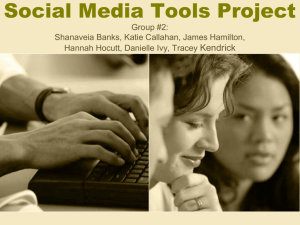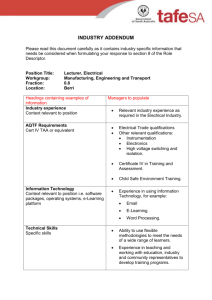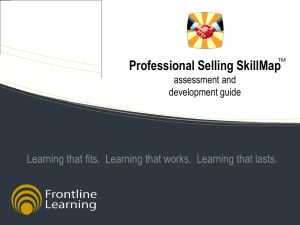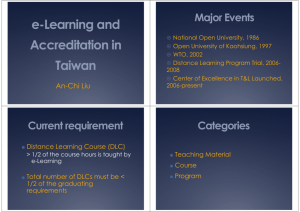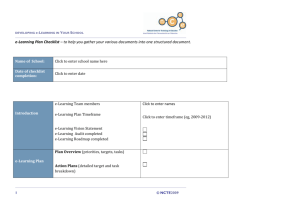Workshop Report - 10th HCD and E-Learning 2015
advertisement
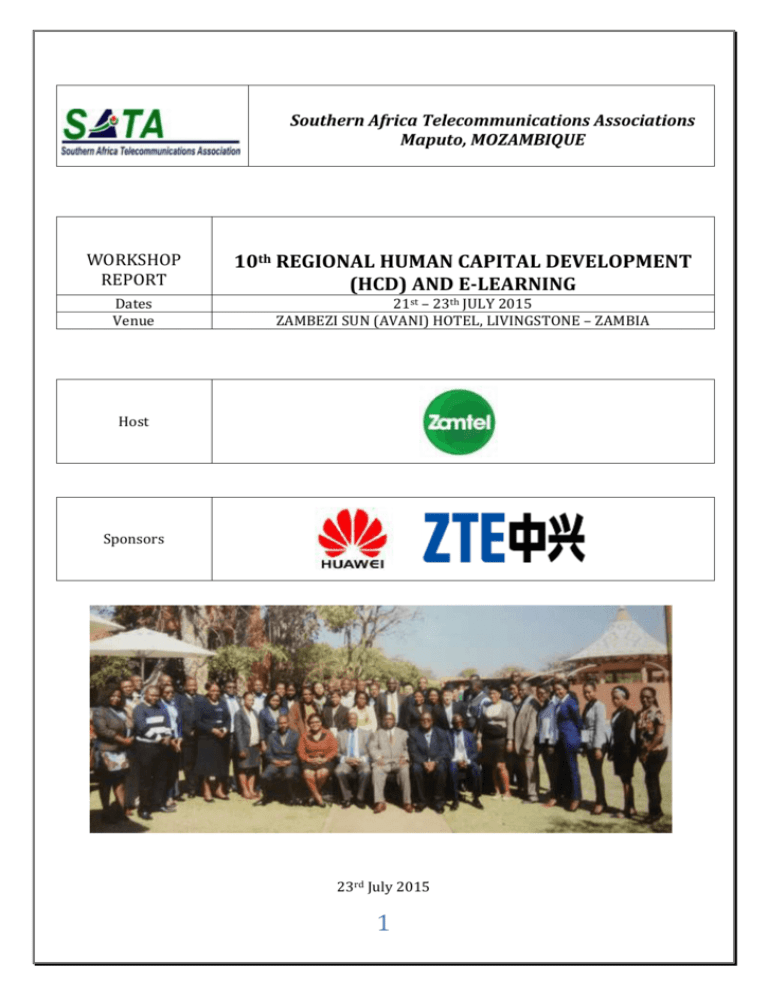
Southern Africa Telecommunications Associations Maputo, MOZAMBIQUE WORKSHOP REPORT 10th REGIONAL HUMAN CAPITAL DEVELOPMENT (HCD) AND E-LEARNING Dates Venue 21st – 23th JULY 2015 ZAMBEZI SUN (AVANI) HOTEL, LIVINGSTONE – ZAMBIA Host Sponsors 23rd July 2015 1 1. The 10th Regional Human Capital Development (HCD) and E-Learning Workshop took place from 21st to the 23rd of July 2015 at Zambezi Sun (AVANI) Hotel in Livingstone, Zambia hosted by Zamtel. 2. The objective of this workshop was to discuss and exchange experience, knowledge, latest thinking and best practices on how organisations invest in their human capital and talent, ethically manage knowledge, and measure the development process against their bottom line and also to enable participants to collectively diagnose complex strategic challenges facing HCD professionals and develop innovative solutions to those challenges. 3. ATTENDANCE 3.1 This year’s event was attended by more than 50 delegates comprising telecom operators, suppliers, consultants, Academia (Universities) and delegates from the Government. 4. OPENING CEREMONY 4.1 The opening remarks were given by SATA Executive Secretary, Jacob Munodawafa, Zamtel Managing Director, Dr Mupanga Mwanakatwe and Honourable Minister of Transport, Works, Supply and Communication, Minister Yamfwa Mukanga, MP who officially opened the workshop. 5. SELF-INTRODUCTIONS Under this agenda item, each delegate introduced himself/herself by mentioning the name, organisation and line of function and what they expect from the workshop. 6. PRESENTATIONS AND CONTRIBUTIONS Following the self-introductions, presentations and contributions were received from various speakers and participants highlighting keys issues, lessons learned and best practices on Human Capital Development and E-Learning. The speakers and contributing experts included professionals from the telecom operators, the industry, the academia and the Secretariat. SATA together with the host Zamtel facilitated the proceedings. The proceedings of the sessions were as follows: Session 1: Why Human Capital?, Managing the Human Capital, Recent Innovations Overview of the Human Capital Development and E-Learning Programme 2015 by Jacob Munodawafa, SATA HCD and E-Learning 2014 Recommedations by Jacob Munodawafa, SATA 2 Action Line Recommendation E-Learning Embrace and Implement E- Learning Programmes Self Service HRIS and Less Paper HR Environment Fully automate Human Resources ICT Tools Provide modern ICT Tools to staff and monitor organisational performance IP Training Provide specific and tailor made IP Training to all staff HR Newsletter Develop and launch a regional HR Newsletter Tele-Working Pilot Tele-Working and Home Working Capacity Building Support Early Learning ICT Programmes There were video presentations on: Forging Inclusive Growth - Creating Jobs Global Human Capital Trends 2014 - Engaging the 21st-century workforce Life at Google. Inside Google's lair - How Google employees work Session 2: Best Practices in Human Capital Development and E-Learning, Recent Innovations The human capital constitutes the critical knowledge, skills, talent and behaviour in any organization. Speakers will present on their organisational structures, best practices, including lessons learnt, with particular focus on aspects, such as, integrated human capital management; career and merit policies; cultural transformational issues, such as, values, ethics, professionalism and trust; human capital development strategies; performance assessment and policy cohesion and co-ordination Business Case and Best Practices for e-Learning Projects in Telcos by Jeremie Ferre, LRMG Perfomance Agency Regional Telecoms HR KPIs as a Mirror of the Organisational Performance by Alice Nyamugama, TelOne Session 3: Best Practices in Human Capital Development and E-Learning The human capital constitutes the critical knowledge, skills, talent and behaviour in any organization. Speakers will present on their organisational structures, best practices, including lessons learnt, with particular focus on aspects, such as, integrated human capital management; career and merit policies; cultural transformational issues, such 3 as, values, ethics, professionalism and trust; human capital development strategies; performance assessment and policy cohesion and co-ordination ICT Skills and E-Learning - Benjamin Mapetese, TelOne Session 4: Best Practices in Human Capital Development and E-Learning The human capital constitutes the critical knowledge, skills, talent and behaviour in any organization. Speakers will present on their organisational structures, best practices, including lessons learnt, with particular focus on aspects, such as, integrated human capital management; career and merit policies; cultural transformational issues, such as, values, ethics, professionalism and trust; human capital development strategies; performance assessment and policy cohesion and co-ordination Human Capital & Learning Development in the ICT Age by Huawei Big Data in Human Resources: Talent Analytics (People Analytics) by Jacob Munodawafa, SATA Session 5: Network of Centres of Excellence and Empowering the Minds through E-Learning A Center of Excellence /Capability Center / Competency Center refers to a team, a shared facility or an entity that provides leadership, best practices, research, support and/or training for a focus area. The focus area in this case might be a technology or business related function. Within Southern Africa, there are a network Centers of Excellence run by SATA, ITU, Afralti and other stakeholders. The speakers will present on their Centers of Excellence and their capabilities Training through Regional Centres of Excellence Centers of Excellence (CoE) Programme, Jacob Munodawafa TelOne Center for Learning, Benjamin Mapetese, TelOne IFT, Augusto Magobeia, Telecomunicacoes de Mocambique (TDM) Session 6: E-Working, Technology Trends and Skills Requirements There is a lot of talk on new technology and the impact it has on the way we do business, but what does it really mean for peple and their skills? New technology trends, such as NGN, Social Computing, Cloud-based platforms, and the demand for real-time data and knowledge, may change the skills mix require. Due to thinly spread resources, organisations face tough tasks preparing for new technology and the skills required Creating E-Learning in an Organisation using Moodle , Jacob Munodawafa, SATA Developing Applications - The benefits of using Open Source Solutions for ELearning, Training and Test beds and Exploration Areas, Jacob Munodawafa, SATA Free and Open source HR Software with an array of HR Modules 4 SANA: Open Source Telemedicine Open BTS - Open Source Cellular Infrastructure OpenIMSCore IMS/LTE Doubango Fraunhofer Institute of Open Communication Systems Session 7: Sharing Knowledge and Experience The human capital constitutes the critical knowledge, skills, talent and behaviour in any organization. Speakers will present on their organisational structures, best practices, including lessons learnt, with particular focus on aspects, such as, integrated human capital management; career and merit policies; cultural transformational issues, such as, values, ethics, professionalism and trust; human capital development strategies; performance assessment and policy cohesion and co-ordination Telecom Operator Experiences Zamtel, Mooka, Silumbu TelOne, Hopewell Zinyau, TelOne Session 8: Regional Human Resources - Benchmarking The prime role of the Human Resources function is to support the achievement of organizational goals by ensuring that relevant and innovative people policies, practices and systems are in place so that the organization can attract, retain and develop outstanding staff In this session All Delegates were kindly requested to upload their job matrices and also complete the KPIs during the first 30 Minutes. Then the discussion led by Jacob Munodawafa looked at the responses Regional Job Grading Database Regional Telecoms Human Resources Key Performance Indicators (KPIs) Session 9: Regional Initiatives, Recommendations and Future Work Workshop Evaluation , Jacob Munodawafa, SATA Regional Initiatives, Recommendations and Future Work The following were agreed action lines for future work. Some were from last year. Action Line Recommendation E-Learning Embrace and Implement E- Learning Programmes 5 Self Service HRIS and Less Paper HR Environment Fully automate Human Resources ICT Tools Provide modern ICT Tools to staff and monitor organisational performance IP Training Provide specific and tailor made IP Training to all staff HR Newsletter Develop and launch a regional HR Newsletter and all experts are strongly encouraged to submit papers for publication in this Newsletter. Tele-Working Pilot Tele-Working and Home Working Capacity Building Support Early Learning ICT Programmes HCD and E-learning Events Have at least Bi-Annual Events Participation during HCD and E-Learning events Strongly encourage all Members and Partners to participate and provide incentives where possible. Evaluation and Monitoring All Members and Partners to report progress on implementation of the action lines and best practices Scoping and content Circulate a questionnaire to gather best practices among Members as it will guide the proceedings of the events. 7. Date And Host Of Next Workshop On Human Capital Development And ELearning The 11th Regional Human Capital Development and E-Learning will take place in Mbabane, Swaziland from 12th – 14th July 2016 hosted by Swaziland Posts and Telecommunications Corporation (SPTC). The exact venue will be communicated next year. The 10th Human Capital Development and E-Learning was officially closed by Zamtel, Chief Human Resources and Administration Officer (CHRAO), Mooka Silumbu. 6
